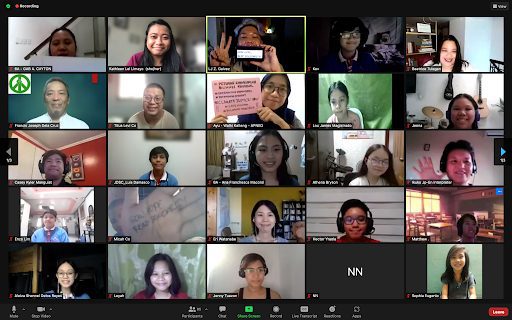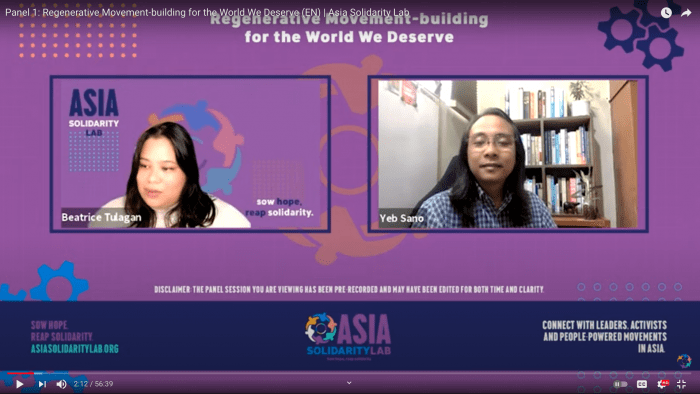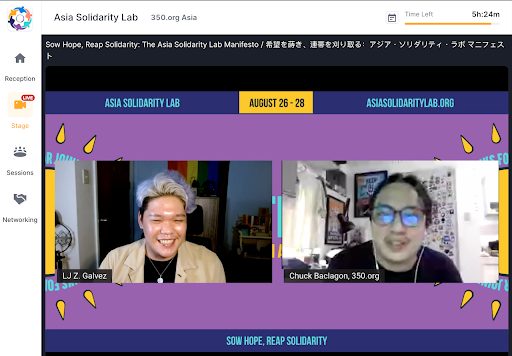The Asia Solidarity Lab, which took place between August 26 and 28 2021, drew in over 1000 registrants from over 60 countries, an immense achievement and show of regional solidarity for the first event of its kind hosted by 350.org. Five plenary panels, 32 learning and strategy sessions and 6 cultural performances ignited emotions and thoughtful dialogue and built new alliances across movements that will become the foundations for strategic cooperation among climate, gender, health, youth, and human rights movements across the region for years to come.

Closing zoom conference with ASL participants
The event was borne out of a longing on behalf of it’s primary organizer, 350’s Asia Regional Organizer Beatrice Tulagen, to foster a sense of intersectional hope, solidarity and compassion across Asia. The program was designed with the intention “to honor the wisdom that is present in the other movements who want essentially the same things we do, and honor the fights and histories of their struggles” said Beatrice.
What was created was a moment where hope was truly sewn and solidarity truly reaped, but more than that, it demonstrated that there are no bounds when it comes to prospects for collaboration and shared knowledge across diverse nations and movements. Bringing together young, old, new, and experienced participants — the Asia Solidarity Lab is a moment that will live in our collective memories and has already planted the seeds of anticipation for its follow-up installment (stay tuned).
Panels, learning and strategy sessions featured experts, storytellers, journalists, organizers, movement builders, lawyers, policy advocates, and more, and concluded with a closing action which entailed inviting participants and organizations to sign the Asia Solidarity Lab Manifesto — a document whose demands include the upholding of human rights and attainment of climate, economic, gender, and health justice as the region looks towards a post-pandemic future.
The event was co-hosted by Asia Climate Rally, Greenpeace Southeast Asia, #BreakFreeFromPlastic, Asia Pacific Network of Environment Defenders, International Women’s Rights Action Watch Asia Pacific and People’s Vaccine Alliance Asia.
The first panel, entitled “Regenerative Movement-building for the world we deserve”, truly set the tone for the three days. Executive Director of Greenpeace Southeast Asia Nadarev Sano contributed some incredibly moving sentiments:
“Hope is taking that first step, even if you don’t see the rest of the road. The urgency of this crisis, and the imperative to address it, has never been clearer. For all of us here, and many around the world, we are reminded that in the face of all of this adversity it’s about having faith in humanity. There are so many wonderful examples of how humanity found the way. We have to stand together and create a new and just global society. That means leaving behind the old normal and welcoming a better future” he said.

ASL Organizer Beatrice Tulagen with Yeb Sabo of Greenpeace Southeast Asia
The second plenary panel, “Sowing Hope through Narrative, Culture and Storytelling”, explored how we can best present the issues we care about, and deepen understanding across audiences to bring about desired change.
Here, journalist Nanticha (Lynn) Ocharoenchai of Climate Strike Thailand emphasized the power of collaboration and the need to maintain authenticity when presenting the stories of others.
“People do care, people are working towards [change]. And you kind of bounce back off each other, especially with people who can be more creative, or people with different sets of skills, or a multidisciplinary expertise. There’s so much that happens with collaboration and bouncing off of ideas, and also supporting each other. I think that’s my way to go about climate activism in a world and a century of many doomsdays” she said.
She spoke about the inclination of some storytellers to dramatize things, particularly in the climate space — there is this need sometimes to describe issues as world-ending total disasters, and solutions as one-size-fits-all world-savers:
“You have to maintain the authenticity of stories. As media, that requires you put your craft into writing, shaping and extracting them, but ultimately you want communities to speak for themselves. Journalists have to actually work harder to get that kind of information. Our job is to share these stories whether that be given to us easily or whether we should dig for it. That comes a lot from doing good research, asking the right questions, and to really allow people – not to write the stories for them – or romanticize about things” she said.
Along with the first day’s plenary panels, there was an assortment of learning and strategy sessions for participants to choose from across the climate, youth organizing, health, human rights and gender tracks, many of which were designed to combine movements in their content. Examples included the ‘Climate and Youth: Stories of Hopes and Struggles’, ‘Indigenous Peoples and Averting a Climate Catastrophe’, ‘Creating Tools for Finance Campaigning’ and ‘Climate Justice Through Gender Justice’.
The second day of the Asia Solidarity Lab opened with a plenary panel entitled ‘Green New Deal for Asia’. Here, we heard from both young and veteran activists and experts who shared their work from their respective countries and campaigns related to securing transformative new economic policy packages that center green energy infrastructure with built in just transition frameworks.
Sohanur Rahman of YouthNet Bangladesh, an organization pushing for a pivot towards renewable energy development and calling for the adoption of a Green New Deal to address the ‘dual crisis’ of climate and inequality in the country, said:
“The climate crisis is not only a development issue. It’s an economic issue. Industrialization is connected to the climate crisis. Capitalism, colonialism and domination – especially man’s domination of nature – has created this crisis”.
“All over, the global young people, they are demanding systems change because we have a problem with the current system. COVID-19 creates a new opportunity to reshape or rebuild our model, through a Green Recovery with a Green New Deal” he continued.
In the day’s second plenary panel, “Build Back Better in Solidarity: Genuine Solutions Towards a Just Recovery”, award-winning Indian activist Vidya Dinker emphasized the need to center women in addressing the climate crisis:
“To find solutions we need to center our women. They are the ones who know how to deal with crises. If we make women captain of the ship, we shall have some real change” she said.
Shiphrah Belonguel, sexual and reproductive health rights activist from the Philippines agreed that the pandemic has underlined existing health and gender inequalities:
“There is a general situation of economic precarity, but the risk is heightened for women and other marginalized genders. The pandemic as a sustained crisis allows us to examine the myriad inequities embedded in our public health systems” she said.
The second day’s learning and strategy sessions, like the first, represented a diverse array of tracks and topics for participants to mingle in, with organizers again encouraging participants to check out sessions that fell outside of their normal focus areas. Some sessions included ‘Championing Loss and Damage’, ‘Storytelling in a Climate Crisis’, and ‘Digital Campaigning for Dummies’.

Event Coordinator LJ Galvez with Asia Finance Campaigner Chuck Baclagon
The event’s final plenary panel on the morning of Day 3 was titled with the Asia Solidarity Lab’s slogan: ‘Sow Hope, Reap Solidarity’. Moderated by 350’s Asia Finance Campaigner Chuck Baclagon, the panel presented and discussed the Asia Solidarity Lab Manifesto — the signing of which represented the amalgamation of the event’s intentions and outcomes.
With five key pillars, the Manifesto includes demands for economic justice, gender, health, and climate justice, and the upholding of human rights. As Asia continues to reel from and grapple with the health, economic and social impacts of the Covid-19 pandemic, communities in the region are faced with added challenges arising from vaccine inequality, climate impacts, human rights violations and oppressive governance structures.
But while the Covid–19 pandemic was a recurring theme throughout not just this panel but the event as a whole, it was pointed out numerous times that many deep seated inequalities and issues of injustice when it comes to these five tracks were a reality that preceded the pandemic.
“It’s important to remember that prior to the pandemic and before climate change intensified, our economies were already battered heavily because of various crises in the last two decades” author and activist Lidy Nacpil said.
“Our communities, workers, and women have been suffering from deep economic hardships and exploitation because our economies have been characterized by these inequalities within countries and across countries. These are based and rooted in economic structures and relations further characterized by the interests of the few and the exploitation of the labor of the many” she continued.
A palpable undercurrent of the Asia Solidarity Lab discussions was the upcoming COP26 climate talks set to be held in Glasgow in November.
“There is so much information available – speculations that are now facts,” said Heeta Lakhani of YOUNGO, the UNFCCC’s youth constituency, in a learning session hosted by Asia-based climate and environmental consultancy Parabukas. “Climate change is affecting people’s lives, and there is no reason that COP26 shouldn’t be the game-changer that we need. If our world leaders cannot come together and agree on something that can pull us through, then I’m really short of words” she continued.
2021 has been a turning point for the climate movement, and for justice movements everywhere. While the impacts of the Covid-19 health crisis have starkly highlighted global inequities, they have also made apparent how swiftly countries are capable of moving to develop policy and foster cooperation in the face of a truly global threat. For many, it may have exposed the ways in which systems are broken, and the hypocrisy of some politics that demand unity but have failed to protect all constituents equally.
For Asia, this has been the case. The harsh reality of vaccine inequality in the wake of the pandemic has served as a solemn warning that international cooperation to deal with the climate crisis may also leave the Global South behind.
But we are uniquely positioned to, and we must continue to — turn this setback into a strength. While we may be pulled back from in-person actions, we have managed to leverage the truly global and networked character of our organization and our partners to adapt swiftly. We managed to cut through the noise of the saturated digital sphere and deliver an event that encompassed all that we stand for, and we hope inspired other organizations and individuals fighting for justice to do the same.
This follows a year in which we have achieved tangible commitments from major fossil finance institutions due to the hard work and organizing power of our country teams. While there is still much to fight for, we have seen unprecedented commitments from financial institutions in funder countries and steps in the right direction when it comes to post-pandemic policies thanks to 350’s Asia country teams’ relentless dedication. Moving forward, we will continue to pressure institutions, campaign against fossil fuel financiers, and facilitate the development of regionally-suited solutions that will see the region lead the world into a decarbonized future.
The Asia Solidarity Lab represented an unprecedented coalescence of movements across Asia, united in their missions to peacefully strategize for the region’s future. We strengthened our core messages, supported each other, and saw the results of our tenacity with decisive achievements. We aimed to build a solidarity that is intersectional, intergenerational, and truly international. One that leaves no one, no community, and no injustice behind — and this is what we will continue to do. See you next time — we’ll be back.
